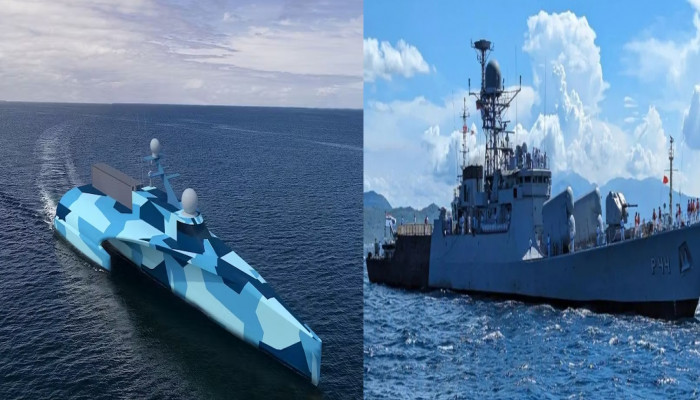GRSE delivers ‘Jaldoot’ unmanned surface vessel to DRDO's NSTL for Naval missions
- In Reports
- 03:05 PM, Dec 06, 2024
- Myind Staff
In a significant achievement for India’s defence sector, Garden Reach Shipbuilders & Engineers (GRSE), a Defence Public Sector Undertaking (PSU), has handed over the “Jaldoot” Unmanned Surface Vessel (USV) to the Defence Research and Development Organisation’s (DRDO) Naval Science and Technological Laboratory (NSTL) in Visakhapatnam. This landmark development follows successful acceptance trials conducted from October 17 to October 21, underscoring India’s growing maritime capabilities.
The “Jaldoot,” jointly designed and developed by GRSE and NSTL/DRDO, is equipped for survey and communication missions. Powered by a rechargeable lithium-ion battery, the vessel boasts advanced features such as waypoint navigation, station-keeping, and failsafe mechanisms to ensure operational precision and reliability. Its compact and lightweight design facilitates seamless integration of various sensors, enabling it to perform diverse tasks. These include tracking Unmanned Underwater Vehicles (UUVs) through its acoustic positioning system, aiding search-and-rescue missions with side scan sonar and maintaining 24/7 operational readiness with a 1080p HD camera featuring night vision.
In developing the “Jaldoot,” GRSE partnered with the domestic start-up M/s Rekise Marine, highlighting the government’s commitment to fostering innovation through the ‘Make in India’ initiative. The collaboration reflects the strength of joint research and development efforts, combining in-house expertise with start-up ingenuity. GRSE described the project as a “testament to India’s growing prowess in defence innovation and self-reliance.”
The achievement is part of a broader trend of advancements in the USV domain within India. Bharat Electronics Limited (BEL) has developed a zero-emission USV designed for hydrographic surveying and coastal surveillance, which can also be customised for logistics and kamikaze missions. Meanwhile, private companies like Sagar Defence Engineering and Dronobotics are making notable strides. Sagar Defence Engineering’s autonomous surface vessel recently completed a 1,500-km voyage from Mumbai to Thoothukudi without human intervention, supported by the Indian Navy. Dronobotics’ Jalchar USV, referred to as a “Drone Boat,” has been designed for disaster management, scientific research, and search-and-rescue missions, showcasing the versatility of unmanned surface systems.
The development and deployment of the “Jaldoot” signal a transformative shift in naval operations, with unmanned systems poised to play a critical role in intelligence gathering, reconnaissance, logistics, and disaster management. By focusing on self-reliance, collaborative innovation and environmental sustainability, India is not only enhancing its national defence capabilities but also emerging as a key player in the global maritime technology market. As these systems continue to evolve, they promise to redefine maritime missions, ensuring a safer and more efficient future for naval operations.







Comments